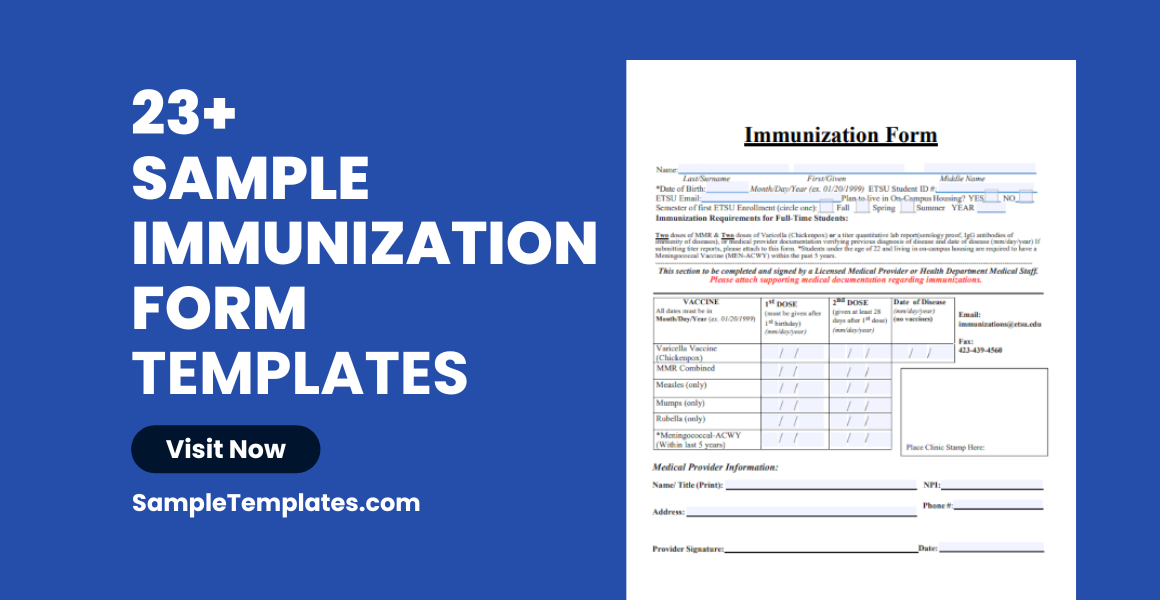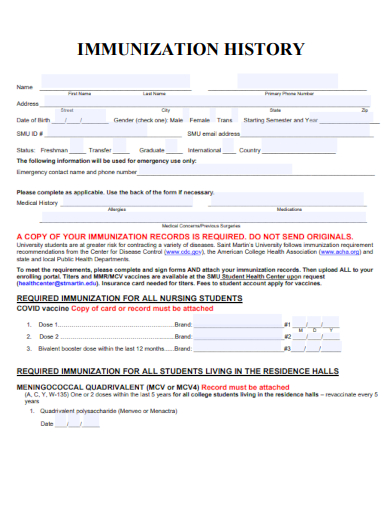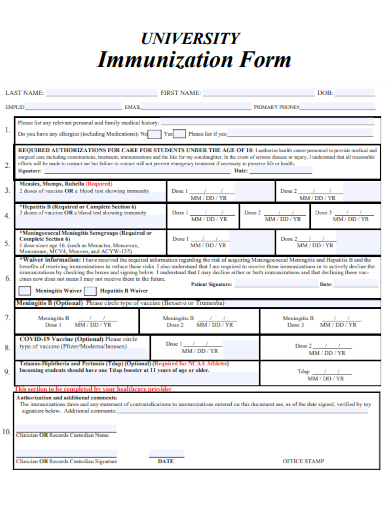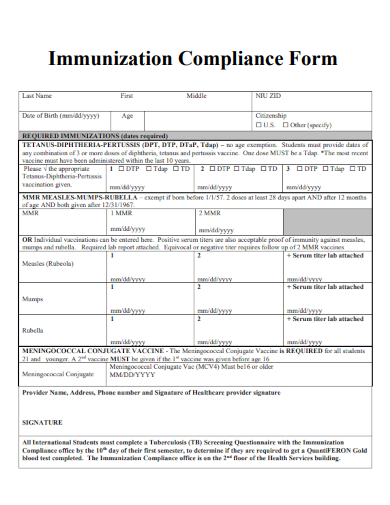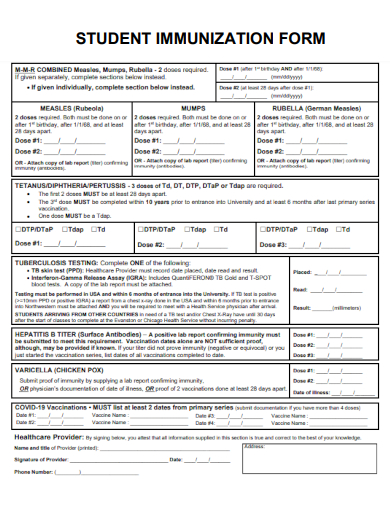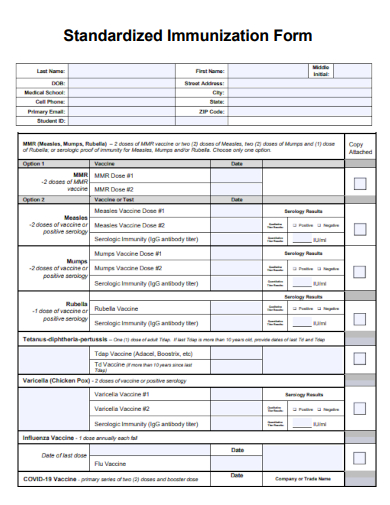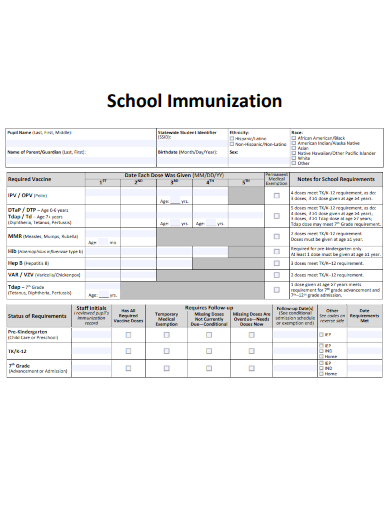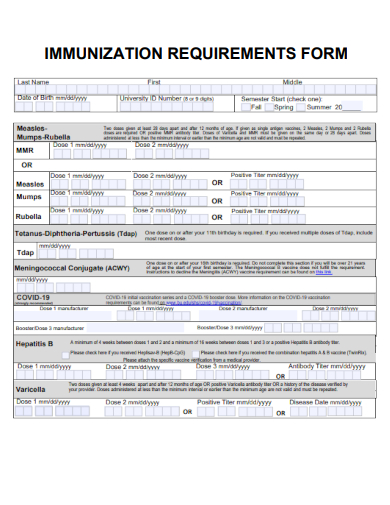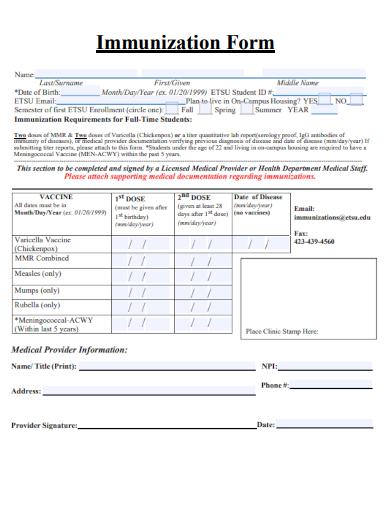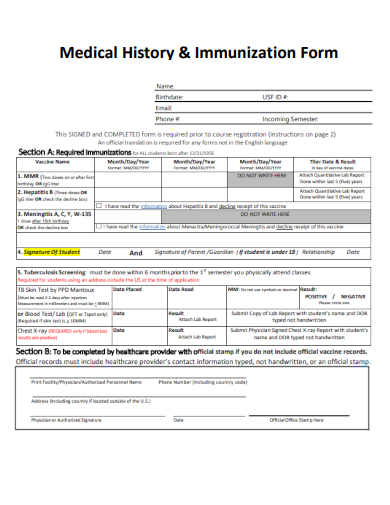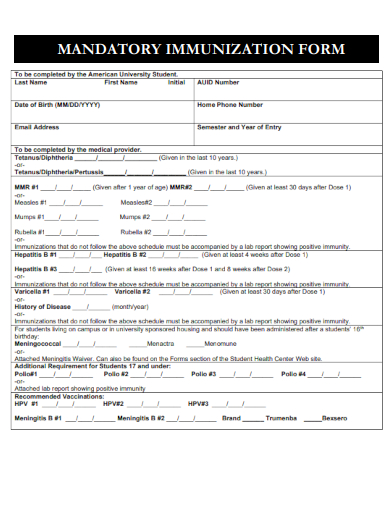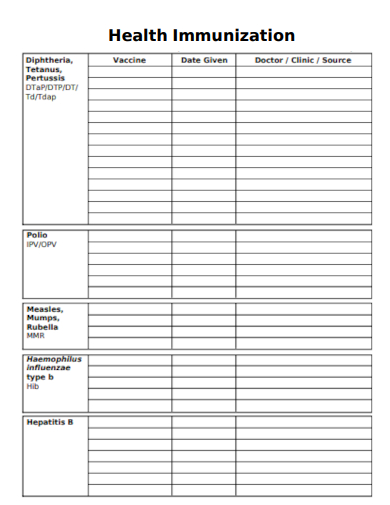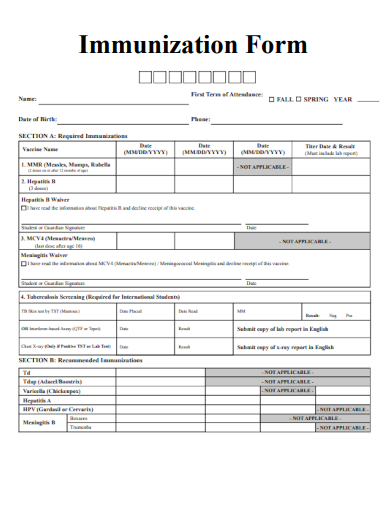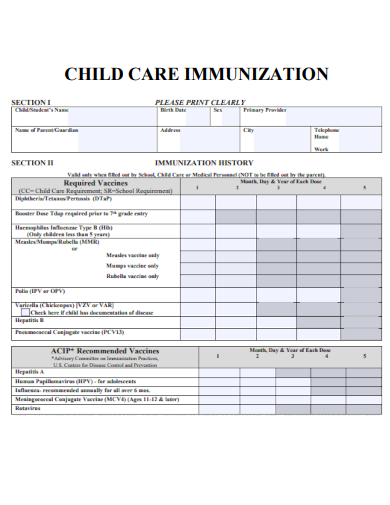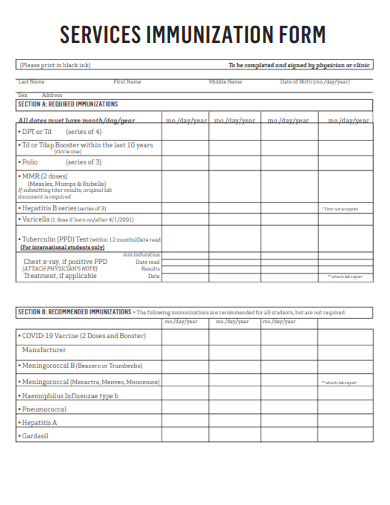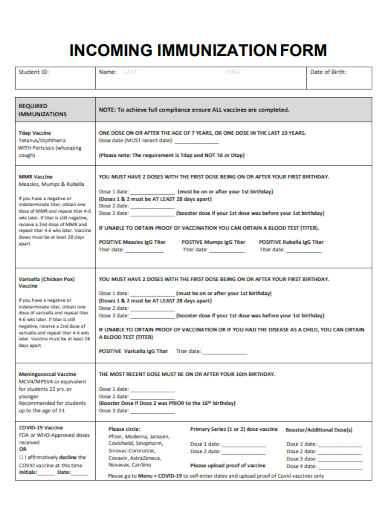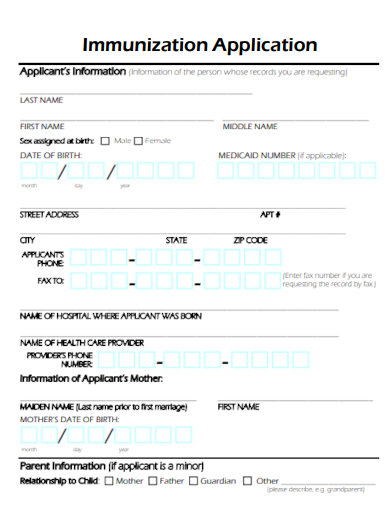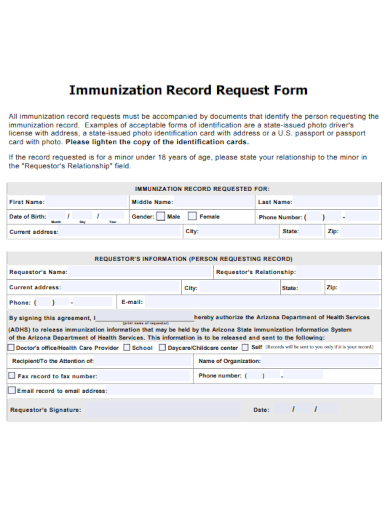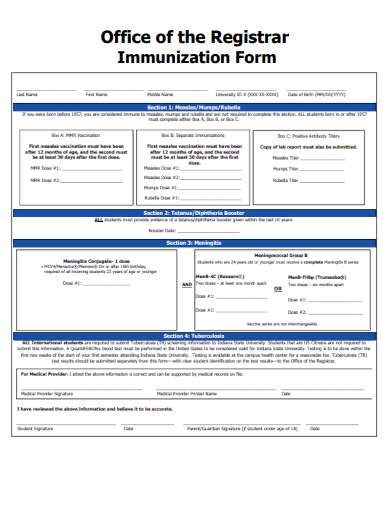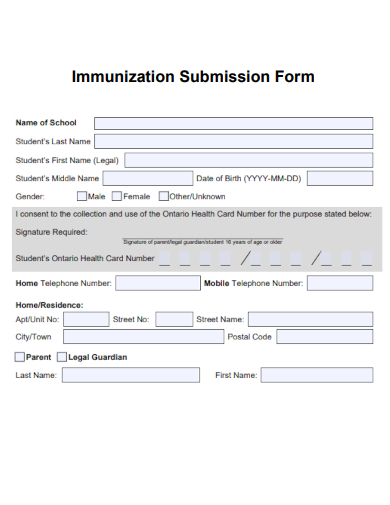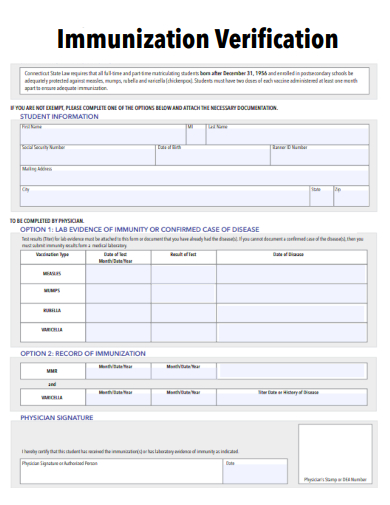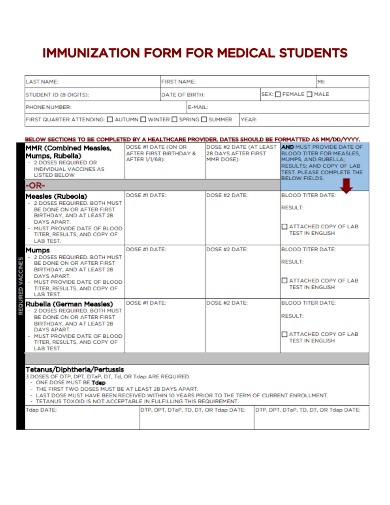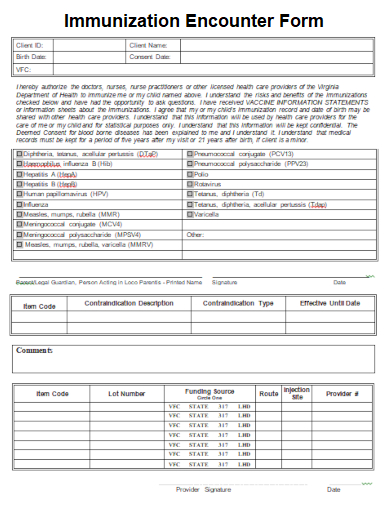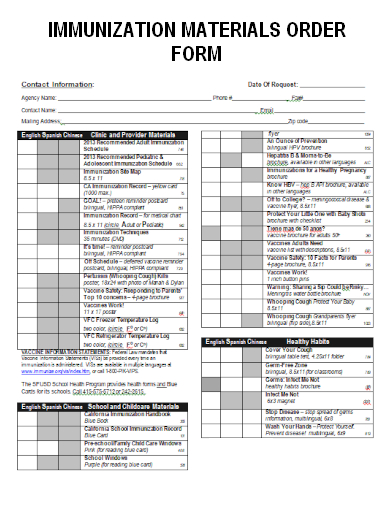In a world increasingly conscious of health and well-being, the ‘Immunization Form’ emerges as a critical document. Serving as a detailed record of vaccinations received, it’s indispensable for schools, travel, and certain job requirements. Ensuring safety and compliance, a well-maintained Immunization Sample Form provides peace of mind in communal settings. Navigate our guide to understand its importance, structure, and the role it plays in fostering a protected and informed community.
FREE 23+ Immunization Form Samples
1. Sample School Immunization Record Form Template
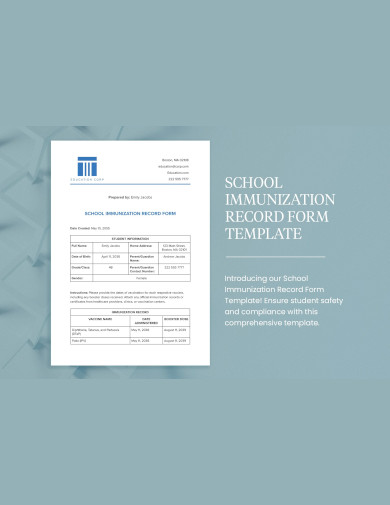
2. Sample Immunization History Form Template
3. Sample University Immunization Form Template
4. Sample Immunization Compliance Form Template
5. Sample Student Immunization Form Template
6. Sample Standardized Immunization Form Template
What is the Immunization Form?
An immunization form is a document that records vaccines an individual has received, often used to verify that a person has had specific vaccinations required for school, travel, or employment.
The Purpose and Importance of the Immunization Form
The Immunization Form is not just a mere piece of sample paper. It holds significant importance for various reasons:
- Proof of Vaccination: It serves as a document that proves an individual has been vaccinated against specific diseases.
- Travel Necessity: Many countries require proof of certain vaccinations before allowing entry, especially for diseases prevalent in particular regions.
- School and Workplace Requirements: Many educational institutions and workplaces necessitate their students or employees to be vaccinated against certain diseases.
Components of the Immunization Form
An Immunization Form typically includes the following components:
- Personal Details: This includes the name, date of birth, and other identifying details of the individual.
- Vaccine Details: Information about each vaccine received, including the vaccine’s name, the date it was administered, the dose, and the lot number.
- Administrative Details: This might include the name of the medical professional who administered the vaccine, the clinic or hospital’s name, and possibly its address.
How to Maintain and Update the Immunization Form
- Regular Updates: Every time you receive a new vaccine, it’s essential to update the professional form. This ensures that the document remains current and reflects all the vaccines you’ve received.
- Digital Records: In the age of technology, many health facilities offer digital immunization records, allowing for easy access and updates. This also reduces the risk of losing or damaging a physical form.
- Backup Copies: It’s wise to keep multiple copies of your immunization record. In the case of travel or relocation, having a backup can be invaluable.
Interpreting the Immunization Form
- Recognizing Vaccine Names: Some vaccines have abbreviated names or might be known under different brand names. It’s crucial to understand these to accurately interpret what vaccines you’ve received.
- Understanding Dates and Doses: The dates indicate when you received each vaccine dose, which is vital for vaccines that require multiple doses at different stages.
The Role of the Immunization Form in Public Health
- Monitoring Vaccine Coverage: On a larger scale, aggregated data from these forms can help health departments assess vaccine coverage in a community, guiding public health initiatives.
- Outbreak Control: In the sample event of an outbreak of a particular disease, these forms can assist in identifying who is already immunized and who might be at risk.
Why is an Immunization Form Necessary?
In the realm of healthcare, documentation is as essential as the actual medical intervention. Among the myriad of documents that play a crucial role, the Immunization Form stands out, especially in the context of preventive medicine. But why is this form so indispensable? Let’s delve deeper into the necessity of the Immunization Form.
A Testament to One’s Health
An Immunization Form is not merely a piece of paper with a sample list of vaccines; it’s a testament to an individual’s proactive steps towards safeguarding their health. Vaccines have been pivotal in combating and eradicating numerous diseases, and this form stands as proof of an individual’s participation in this protective measure.
Unlocking Global Travel
As globalization brings the corners of the world closer, the Immunization Form becomes a golden key. Many countries, to protect their citizens and prevent the spread of diseases, require incoming travelers to provide proof of specific vaccinations. Without this form, access to certain parts of the world might be restricted.
Ensuring Educational and Workplace Safety
Educational institutions, from daycare centers to universities, often require students to provide an Immunization Form. The collective gathering of students from various backgrounds can be a hotspot for disease transmission. By ensuring that students are vaccinated, institutions mitigate this risk, promoting a healthier learning environment.
Similarly, specific workplaces, especially those in the healthcare sector, necessitate their employees to be vaccinated against certain diseases. This not only ensures the safety of the employee but also protects the vulnerable population they might serve. You can also see more templates like Vaccine Consent Forms.
Guiding Medical Decisions
In certain medical situations, knowing an individual’s vaccination history is paramount. For instance, before administering a booster shot or during a disease outbreak, a healthcare provider can refer to the Immunization Form to make informed decisions, ensuring the patient’s safety and well-being.
Supporting Public Health Initiatives
From a broader perspective, Immunization Forms play a pivotal role in shaping public health initiatives. By analyzing aggregated data from these forms, health departments can:
- Gauge the level of herd immunity in a community.
- Identify pockets of under-vaccinated populations.
- Direct resources and campaigns to areas that need them the most.
Legal and Personal Implications
Beyond health, the Immunization Form can also have legal implications. In situations of custody battles or form of school admissions, this form might be requested as part of necessary documentation. Moreover, having a well-maintained form provides individuals with peace of mind, knowing they are shielded against certain diseases.
The Legal Importance of an Immunization Form
Immunization forms, while primarily serving as medical records, carry significant legal weight. They act as official documentation verifying that an individual has received specific vaccinations, thereby playing a crucial role in various legal scenarios. Below, we explore the multifaceted legal importance of an Immunization Form.
Access to Education
- School Admission: Many educational institutions, from daycares to colleges, require students to submit their Immunization Forms as part of the admission process. This is to ensure that the institution remains compliant with state or regional laws aimed at maintaining a safe environment free from vaccine-preventable diseases.
- Special Exemptions: While immunizations are generally mandated, exceptions exist for religious or medical reasons. In such cases, the Immunization Form, paired with appropriate documentation justifying the exemption, becomes crucial to ascertain the student’s vaccination status. You can also see more templates like Medical History Forms.
Employment Prerequisites
- Healthcare Sector: Especially in the healthcare field, where professionals come into contact with vulnerable populations, employers often require proof of immunization against diseases like influenza, hepatitis B, or tuberculosis. The Immunization Form acts as an official record fulfilling this requirement.
- International Assignments: Employees selected for assignments in foreign countries might need to prove their vaccination status, particularly if the destination has endemic diseases. The form helps streamline visa and work permit processes.
Travel and Immigration
- International Travel: Certain countries mandate travelers to provide proof of vaccination against specific diseases, such as yellow fever, before granting entry. The Immunization Form, in such scenarios, serves as a legally accepted document.
- Immigration: Immigrants, especially those seeking permanent residency or citizenship, might be asked to present their Immunization Forms as part of the health vetting process.
Legal Disputes and Custody Battles
In situations where the welfare of a child is being determined, such as custody battles, the child’s Immunization Form can come into play. It might be used:
- To determine if a parent has been diligent in providing medical care.
- As evidence in cases where parents disagree on vaccinating their child. You can also see more templates like Medical Form Samples.
Public Health Emergencies
During outbreaks of contagious diseases, local or national authorities might necessitate individuals to prove their immunization status:
- To determine who can access certain public spaces or events.
- To identify individuals who might be at higher risk and should be quarantined or undergo medical observation.
Documenting Exemptions
While vaccination is beneficial for the majority, certain individuals might have medical or other reasons to avoid specific vaccines. The Immunization Form can:
- Provide a record of any missed vaccines and the reasons for the omission.
- Act as evidence if an individual faces legal consequences for not being vaccinated.
Who Creates an Immunization Form?
Healthcare Providers
The primary creators of Immunization Forms are healthcare providers who administer vaccinations. This includes:
- Pediatricians: Given that many vaccinations are administered during childhood, pediatricians often initiate and maintain the Immunization Form for their young patients.
- General Practitioners/Family Physicians: These doctors will often provide vaccinations, especially for adults, and will either initiate or update Immunization Forms accordingly.
- Vaccination Clinics: Specialized clinics, which might be set up for annual flu shots or mass vaccination campaigns, will also create or update these forms. You can also see more templates like Record Form Samples.
- Hospitals: If a person receives a vaccine during a hospital stay, the hospital’s medical staff will be responsible for documenting it.
Health Departments and Government Entities
In some regions, the government, particularly the health department, plays a proactive role in immunization record-keeping:
- Centralized Immunization Databases: Some countries or states maintain centralized immunization databases where healthcare providers input vaccination data. Individuals can then access their Immunization Form or record from this database.
- National Immunization Campaigns: During national immunization drives, the government might issue standardized Immunization Forms to ensure uniformity in record-keeping across the country.
Educational Institutions
While educational institutions don’t typically create Immunization Forms, they play a role in its propagation:
- Form Distribution: Schools and colleges might distribute standardized Immunization Forms for parents or students to have filled out by their healthcare provider, ensuring consistency in the records they receive.
Individuals and Parents
In some cases, individuals or parents take the initiative:
- Personal Record-Keeping: Some proactive individuals or parents maintain their own or their children’s Immunization Forms, updating them with each vaccine. While this method requires diligence, it provides immediate access to one’s immunization history.
- Travel-Specific Forms: For individuals traveling to regions with specific vaccination requirements, they might need to obtain a specialized Immunization Form, like the International Certificate of Vaccination or Prophylaxis (ICVP), which they then get validated by a healthcare provider. You can also see more templates like Medical History Forms.
7. Sample School Immunization Form Template
8. Sample Immunization Requirements Form Template
9. Sample Immunization Form Template
10. Sample Medical History & Immunization Form Template
11. Sample Mandatory Immunization Form Template
12. Sample Health Immunization Form Template
13. Sample Blank Immunization Form Template
14. Sample Child Care Immunization Form Template
15. Sample Services Immunization Form Template
16. Sample Incoming Immunization Form Template
17. Sample Immunization Application Form Template
18. Sample Immunization Record Request Form Template
19. Sample Office of the Registrar Immunization Form Template
20. Sample Immunization Submission Form Template
21. Sample Immunization Verification Form Template
22. Sample Immunization Form for Students Template
23. Sample Immunization Encounter Form Template
24. Sample Immunization Materials Order Form Template
How do you Create a Immunization Form?
Immunization records play a pivotal role in safeguarding public health. These records not only help to ensure that individuals receive timely vaccinations but also assist public health officials in monitoring the spread of diseases. You can also see more templates like Clearance Form Samples. Here’s how you can create an efficient immunization form:
Step 1: Define the Purpose and Scope Every form starts with its intended purpose. Ask yourself: Who is this form for? Children, adults, travelers, or a niche population? Depending on the target group, the vaccines listed will vary. For instance, a children’s form will have a different set of required vaccines compared to an adult’s or a traveler’s form.
Step 2: Choose a User-Friendly Layout A clear, organized layout is essential for a form that will be frequently updated. Consider using tables or charts. Designate rows for different vaccines and columns for relevant details such as the date of immunization or dose amount. This ensures that information is easily located and understood at a glance.
Step 3: Detail Specific Vaccines and Dosages Clearly list all necessary vaccines. For those that require multiple doses or boosters, provide space for each entry. Additionally, allocate an area for sample notes, allowing healthcare providers or individuals to jot down any reactions or side effects post-immunization.
Step 4: Include Personal and Physician Details Personal information such as name, date of birth, and contact details should be placed prominently at the top of the form. Similarly, there should be a dedicated area for the healthcare professional administering the vaccine, capturing their details and signature, which acts as a verification of the information’s authenticity.
Step 5: Add a Disclaimer and Privacy Statement It’s prudent to incorporate a disclaimer clarifying the accuracy of the information presented. This ensures that both patients and health professionals are on the same page regarding the data’s accuracy. Additionally, a privacy statement detailing the handling, storage, and potential sharing of the data lends an added layer of trust and transparency between the patient and the healthcare provider.
In Conclusion, the immunization forms are while seemingly straightforward, plays a pivotal role in individual health and broader public health contexts. Maintaining and understanding this design document can ensure that one is protected from various diseases and can provide proof of such protection when needed. As our world becomes more interconnected, the importance of vaccination and accurate record-keeping will only increase. Whether for personal use, travel, or professional reasons, the Immunization Form remains an indispensable tool in our health arsenal.
Related Posts
Parent Consent Form Samples & Templates
Sample Release of Liability Forms
Sample Training Feedback Forms
Sample Sworn Affidavit Forms
Agreement Form Samples & Templates
Vehicle Inspection Forms Samples & Templates
Sample Employee Advance Forms
Sample Child Travel Consent Forms
Sample Testimonial Request Forms
Sample Employee Details Forms
Sample Divorce Forms
Sample Attestation Forms
Employee Performance Appraisal Form Templates
FREE 9+ Sample Presentation Evaluation Forms in MS Word
FREE 10+ School Admission Form Samples & Templates in MS Word | PDF
